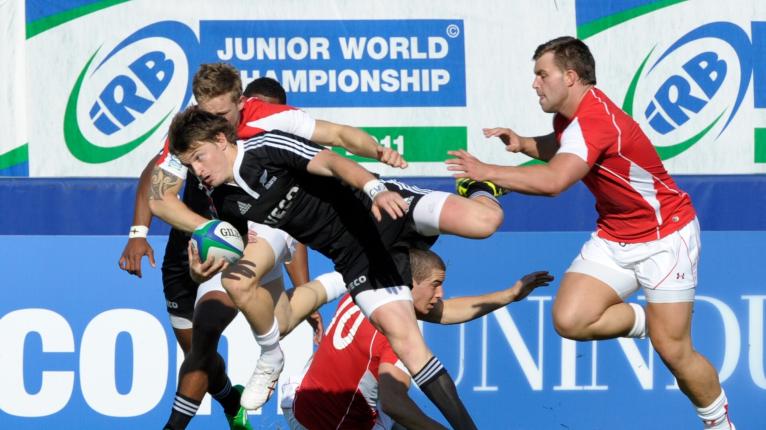Heavyweight prop snubbed by Gatland who bench presses 210kg ready for Six Nations debut

Wales’ winter regime change has given WillGriff John, the 20-stone Sale Sharks prop, the chance to prove he can be a major force at international level after he was named in Wayne Pivac’s first Six Nations squad.
The New Zealander, who has replaced Warren Gatland as head coach of the recent World Cup semi-finalists, was unable to pick Exeter Chiefs tighthead Tomas Francis who is still recovering from the shoulder injury suffered in Japan.
That created a vacancy for a heavyweight tighthead prop to be included and while John, 27, failed to convince Gatland he was ready for Test rugby, Pivac had been a regular visitor this winter to the Sale Sharks training ground outside Manchester to keep updated on the prop’s form.
Jonathan Humphreys, the new Wales forwards coach, also took a close interest in the 6ft 2in former Cardiff Blues prop, whose 2017 arrival in the Premiership has now been rewarded with an international level call-up.
“I knew the Welsh management were watching me and I was told at the start of the season it was a whole new coaching staff and set-up and they were going to look at everyone and leave no stone unturned,” said John to RugbyPass.
(Continue reading below…)
The Rugby Pod take a look at some BIG transfer rumours
“The most frustrating thing (under Gatland) was that I had never been told why I wasn’t a part of the squad. The advantage of a whole new set-up is that they will pick whoever they think is best.”
Born in Plymouth but raised in Rhondda, the former Wales under-20s player began his career with Pontypridd before playing for Cardiff Blues before he then headed to New Zealand where he appeared for Northland.
He then returned to England and joined Doncaster Knights where his form caught the attention of Steve Diamond, Sale’s director of rugby.
Congratulations to @WillGriffJ who is heading to the @SixNationsRugby with the @WelshRugbyUnion! ?#SharkTime | @UKFast pic.twitter.com/2xMyLxto2w
— Sale Sharks ? (@SaleSharksRugby) January 15, 2020
John moved up to the Gallagher Premiership in 2017 and he currently shares the No3 jersey with 30-cap Coenie Oosthuizen, who arrived at the club this season from the Super Rugby Sharks, joining a large contingent of Springboks in Manchester.
John’s unusual Christian name is an amalgamation of his two grandfathers which does cause confusion. “When you go to the doctors you get called John and it does cause some confusion for a lot of people, but I’m used to it now.
“My dad came up with the name and his dad was Griffith and my Mum’s father was William. He just thought it would be good to put them together. I was born in Plymouth, went to Australia when I was quite young, came back at five and grew up in the Rhondda and played at Pontypridd.”
John appeared in all of Sale’s 22 Premiership fixtures last season and has benefitted from the experience of Rob Webber, the former England hooker, but he goes into the Wales set-up knowing he faces stiff competition from Dillon Lewis (Cardiff Blues) and Leon Brown (Dragons).
“I went out to play in New Zealand and it was really helpful for my career because the rugby was so much quicker than I had experienced before. I played in a New Zealand Barbarians game against the Auckland Blues and when I got my head out of the scrum, the ball was on the far side of the pitch!
“I came back and joined Doncaster and the hope was that I could then join a Welsh region but that didn’t work out. At Doncaster, it took a while to get used to the way teams scrummaged and how they went for penalties, but in the last 18 months, it kind of clicked. Things were going well and I got the chance to join Sale.
Five uncapped players in Wayne Pivac's squad for his first Six Nations as Wales bosshttps://t.co/846gUyZKm6
— RugbyPass (@RugbyPass) January 15, 2020
“The move up to the Premiership was hard in that the ball is in play for much longer – it can be upwards of 40 minutes. When you play against the best teams the speed of the game is the big difference and that was the hardest thing to adapt to. ”
John’s large frame was developed in his teenage years, weight training in Wales, and it helped him get at a taste of international rugby – although one match was particularly difficult.
He played for the Wales under-20s team alongside current internationals Liam Williams (Saracens) and Cory Hill (Dragons) when they lost 92-0 to New Zealand in 2011.

The ‘Baby Blacks’ had a formidable line up: Beauden Barrett; Waisake Naholo, Rhys Llewellyn, Lima Sopoaga, Charles Piutau; Gareth Anscombe, TJ Perenara; Ben Tameifuna, Codie Taylor, Solomona Sakalia, Brodie Retallick, Steven Luatua, Brad Shields, Sam Cane and Luke Whitelock (capt).
“That under-20s team is close to the current All Blacks team and it is amazing how many of them went on to Test rugby,” reflected John.
“I can’t explain why we lost so heavily in that match and going into the game we didn’t know too much about them. When you look back at it now you realise exactly who they were how well drilled they were as a team.”
WATCH: RugbyPass have made something truly special with the Barbarians rugby team







































